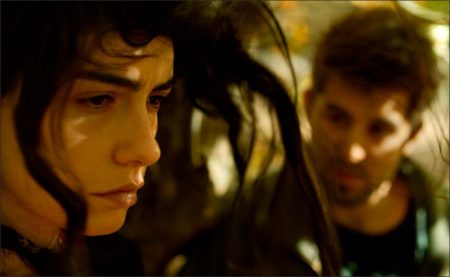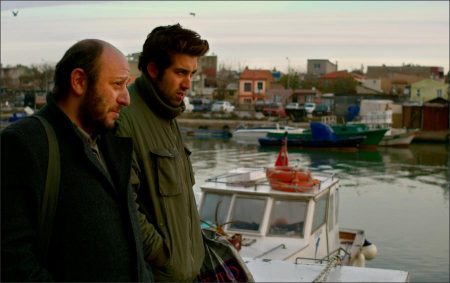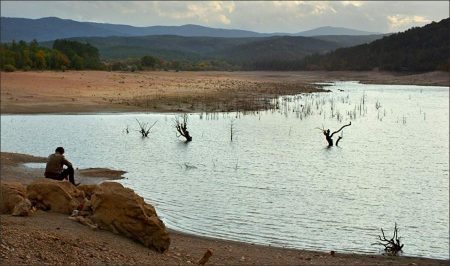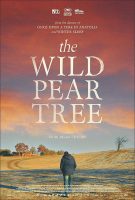Taglines: What a father keeps hidden is revealed in the son.
The Wild Pear Tree – Ahlat Agaci Movie Storyline. Sinan (Aydin Doğu Demirkol), an aspiring writer, returns home after university hoping to scrape together enough money to publish his first novel. He wanders the town encountering old flames and obstinate gatekeepers and finds his youthful ambition increasingly at odds with the deferred dreams of his gambling-addict father (Murat Cemcir). As his own fantasies mingle with reality, Sinan grapples with the people and the place that have made him who he is.
Following in the great tradition of family dramas like Death of a Salesman and Long Day’s Journey Into Night, The Wild Pear Tree weaves an evocative tale of creative struggle and familial responsibility with inspired performances, sumptuous imagery and surprising bursts of humor. It’s one of Ceylan’s most personal works to date, a film as rich, layered and uncompromising as the novel its headstrong hero is working to publish.
The Wild Pear Tree (Turkish: Ahlat Ağacı) is a 2018 Turkish drama film directed by Nuri Bilge Ceylan. It was selected to compete for the Palme d’Or at the 2018 Cannes Film Festival. It was also selected as the Turkish entry for the Best Foreign Language Film at the 91st Academy Awards, but it was not nominated.
Film Review for The Wild Pear Tree
The Wild Pear Tree is a gentle, humane, beautifully made and magnificently acted movie from the Turkish film-maker and former Palme winner Nuri Bilge Ceylan: garrulous, humorous and lugubrious in his unmistakable and very engaging style. It’s an unhurried, elegiac address to the idea of childhood and your home town – and how returning to both has a bittersweet savour.
As in his previous film, Winter Sleep, he draws on the spirit of Chekhov. But his style is all his own: not Chekhovian, but Ceylanian. There are scenes in which people placidly watch TV: largely histrionic soaps whose contrast to the film itself is a type of comedy the director playfully allows us to notice. In fact, The Wild Pear Tree is not unlike a telenovela of family life, taken at a very high-minded, andante pace.
An ambitious, malcontent young graduate and would-be writer comes back to his rural village with a diploma but no job. Now he has to decide whether to take the exams to be a teacher like his old man. There is also his military service to get out of the way. He senses defeat and disappointment with life in some of those local friends and family he has left behind – or is it that he has projected on to them his own dread of a failure yet to come? Has he misread their humility and acceptance and miscalculated the price he will have to pay for his yearned-for differentness from them, and for all that glamorous big-city success?
The graduate is Sinan (Aydın Doğu Demirkol), who has come back with ambiguous feelings about the place where he grew up. As for so many writers, his home looks wonderful when he is away from it, when it is tamed and transformed by his imagination. But actually being there reminds him of all its irritations and absurdities. Sinan is from a village near the port of Çanakkale, a tourist destination on account of being near the site of the first world war Gallipoli campaign, and also the ancient city of Troy. We see Sinan at one stage trudging past a huge statue of the Trojan horse, built for the Brad Pitt movie Troy and now reverently maintained in the city.
Sinan knows he cannot afford to despise bumpkins, because his literary debut is going to be a work about this very homeland. It’s an autobiographical essay /memoir about the local landscape, entitled The Wild Pear Tree, concerning that rough beautiful terrain where these trees grow. Later, Sinan’s scapegrace dad will say that all the people around those parts are like wild pears: “Misfits, solitary, misshapen.” Ceylan saves this line for near the end, perhaps reluctant to make the title’s metaphorical function too obvious.
His father is Idris, tremendously played by Murat Cemcir, a man whose youthful charm and romanticism has curdled with age into a pre-emptive bluster and cajoling. He is a gambling addict who has borrowed money all over town; his addiction has kept his family on the poverty line. Only by confiscating his debit card and grabbing his pay packet the moment it arrives has his wife kept the household afloat. But Idris owns a tiny bit of land near the house, and he has got it into his head that there is a water source there, so he spends every weekend digging a well, hoping for the water to come trickling in. Sinan senses that this tough quest is not unlike a writer’s life. There is a quietly hilarious sequence when we watch Idris, Sinan and Idris’s own exasperated father trying to winch a boulder out of this deep pit.
Warily, Sinan touches base with everyone in the village: apart from everything else, he needs loans or donations to publish his book himself. His mum’s elderly father is a retired imam who is used, and rather exploited, by the conceited young incumbent as an unpaid replacement for various duties. He sees some of his old friends. Most importantly, he sees Hatice (Hazar Ergüçlü), a beautiful young woman who he was once in love with, and probably still is.
There are some stunning images in the film: particularly the vision of a baby covered in ants, which is to be developed into that of an adult covered in ants. There are great scenes; it is in some sense a short-story anthology of such scenes. His encounter with Hatice is breathtakingly good: the mood shifts and tones are superbly managed. She teases him about his grumpiness; he goads her about what looks like an imminent submission to marriage.
He thought she was still together with a rival of his, but this is wrong. Their tensely murmured conversation has a fascinatingly erotic conclusion. I was a little sad that this gripping relationship disappears from the film, except in a later scene in which Hatice is the reason for a punch-up between her ex-boyfriend Riza (Ahmet Rifat Sungar) and Sinan, who appears to have been unable to resist boasting about this earlier encounter.
There is another glorious scene in which the bumptious Sinan notices a famous writer Süleyman (Serkan Keskin) in a Çanakkale bookshop and presumes to go up and ask for advice. Cautiously, Süleyman agrees but is then dismayed by the ungrateful way Sinan doesn’t seem to accept or listen to what he has to say, and reveals that he only wants to needle Süleyman about all the petty vanities and hypocrisies of the literary establishment. Irritated beyond endurance, Süleyman finally screams at him to go away – and the audience can see exactly how he feels.
But we have to sympathise with Sinan in another beguilingly comic scene in which the young man, having failed to get public money to help with publishing costs from the mayor, goes to see a local builder because the man is supposed to be a great reader and reputedly helps with projects like this. When Sinan gets there, he realises the awful truth. This builder doesn’t care at all for being a sponsor of literature – he simply bought a few books of local history because he wanted lucrative government contracts from the mayor. The excruciating disappointment and strained politeness of this scene are a joy.
And all the time the question of life, and the gamble on life that we are required to make in our early 20s, runs under the movie’s meandering path. It is another deeply satisfying, intelligent piece of film-making from Ceylan. The indulgent Idris tells his son that he often has a wild pear for breakfast and it is delicious. This film is, too.
The Wild Pear Tree (2019)
Directed by: Nuri Bilge Ceylan
Starring: Aydın Doğu Demirkol, Murat Cemcir, Bennu Yıldırımlar, Hazar Ergüçlü, Serkan Keskin, Tamer Levent, Akın Aksu, Ahmet Rıfat Şungar, Kubilay Tunçer, Öner Erkan, Özay Fecht, Kadir Çermik, Ercüment Balakoğlu, Sencar Sağdıç, Asena Keskinci
Screenplay by: Akın Aksu, Ebru Ceylan, Nuri Bilge Ceylan
Assistant Director: Yıldız Aşanboğa
Cinematography by: Gökhan Tiryaki
Film Editing by: Nuri Bilge Ceylan
Art Direction by: Meral Aktan
Distributed by: Memento Films Production
Release Date: February 1, 2019
Views: 139






